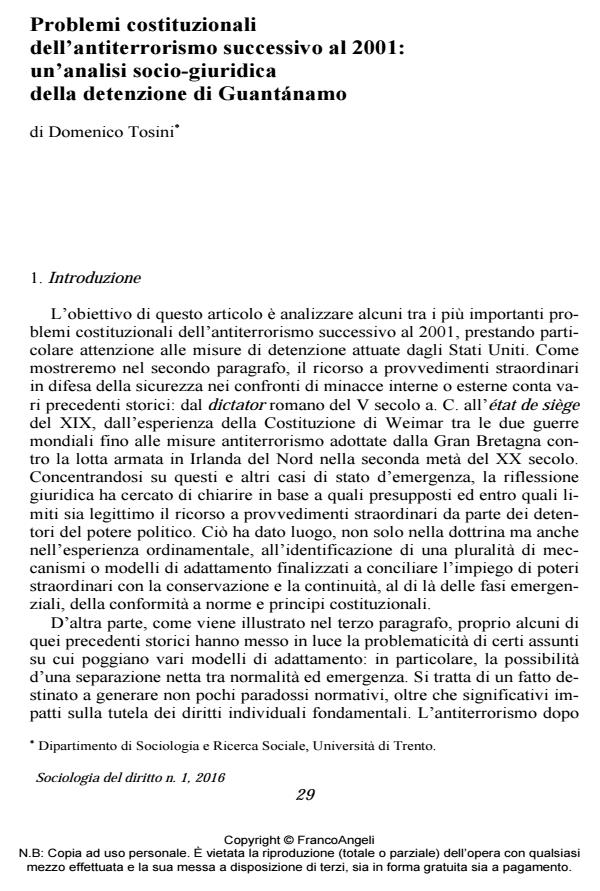Problemi costituzionali dell’antiterrorismo successivo al 2001: un’analisi socio-giuridica della detenzione di Guantánamo
Titolo Rivista SOCIOLOGIA DEL DIRITTO
Autori/Curatori Domenico Tosini
Anno di pubblicazione 2016 Fascicolo 2016/1
Lingua Italiano Numero pagine 23 P. 29-51 Dimensione file 219 KB
DOI 10.3280/SD2016-001002
Il DOI è il codice a barre della proprietà intellettuale: per saperne di più
clicca qui
Qui sotto puoi vedere in anteprima la prima pagina di questo articolo.
Se questo articolo ti interessa, lo puoi acquistare (e scaricare in formato pdf) seguendo le facili indicazioni per acquistare il download credit. Acquista Download Credits per scaricare questo Articolo in formato PDF

FrancoAngeli è membro della Publishers International Linking Association, Inc (PILA), associazione indipendente e non profit per facilitare (attraverso i servizi tecnologici implementati da CrossRef.org) l’accesso degli studiosi ai contenuti digitali nelle pubblicazioni professionali e scientifiche.
L’articolo esamina alcuni tra i problemi più rilevanti dell’antiterrorismo dopo il 2001, considerando come studio di caso le misure adottate nel campo di prigionia di Guantánamo. È noto che il pensiero giuridico e gli ordinamenti degli Stati moderni hanno cercato di individuare criteri e modelli istituzionali in grado di assicurare la compatibilità tra il ricorso a poteri straordinari diretti ad affrontare minacce e calamità e la loro conformità ai principi e alle norme costituzionali alla base degli stessi ordinamenti. L’antiterrorismo innescato dagli attentati dell’11 settembre e da altri eventi simili come gli attacchi suicidi del 2005 a Londra ha messo in luce la precarietà di tale compatibilità. Ciò è stato particolarmente evidente nelle modalità con cui si è fatto ricorso alla carcerazione preventiva: in quest’ambito, soprattutto nel caso della detenzione attuata nella prigione cubana. Nonostante una serie di decisioni della Corte Suprema sulla detenzione di Guantánamo, dirette a contrastare la dilatazione dei poteri dell’esecutivo, l’indagine della retorica dell’Amministrazione Bush, della natura delle misure approntante e delle contromosse rispetto ai pronunciamenti della Corte stessa ha permesso di evidenziare una logica di fondo: la pressione sull’intero apparato dello Stato con l’obiettivo di subordinare il processo decisionale sullo stato d’emergenza al primato di criteri di efficienza/inefficienza delle misure rispetto alla prevenzione delle minacce e alla tutela della sicurezza, a scapito della loro costituzionalità/incostituzionalità.
Parole chiave:Antiterrorismo Guantánamo - Libertà civili - Stato d’emergenza - Terrorismo
Domenico Tosini, Problemi costituzionali dell’antiterrorismo successivo al 2001: un’analisi socio-giuridica della detenzione di Guantánamo in "SOCIOLOGIA DEL DIRITTO " 1/2016, pp 29-51, DOI: 10.3280/SD2016-001002